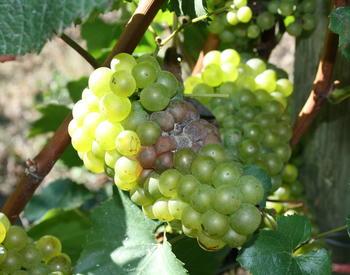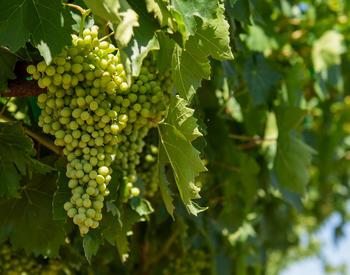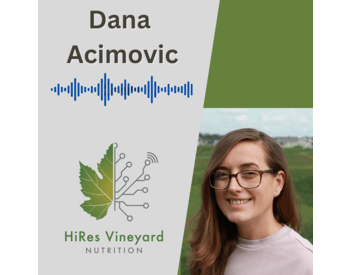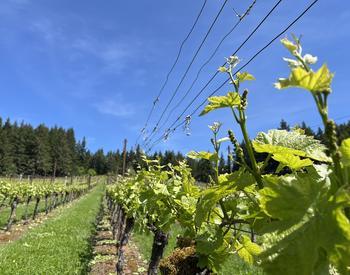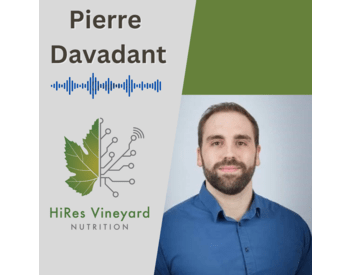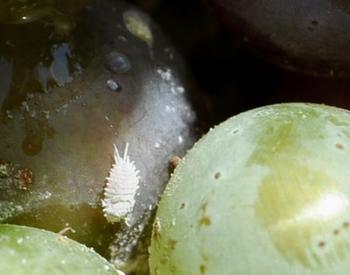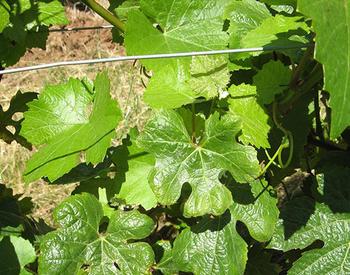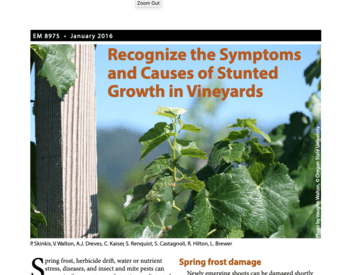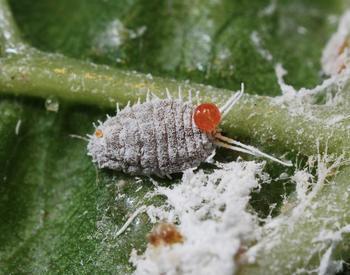Transcript
00:00.00 Nataliya Shcherbatyuk
Welcome to season 2 of the HiRes Vineyard Nutrition Podcast. I'm Nataliya Shcherbatyuk, postdoc at Washington State University and program manager for the High-Resolution Vineyard Nutrition Project. I will be a host for this episode as today we are interviewing Patty Skinkis - Viticulture Extension Specialist and Professor at Oregon State University. If you have been following our podcast, you know her as the regular host. However, today we want to learn more about her role in the project and to understand the importance of vineyard nutrition management on the practical scale, as well as the importance of outreach and education as part of the research and discovery process. Hi Patty, it is so nice to have you here, and can you please just tell us about your background and how you became interested in viticulture.
00:00.59 Patty Skinkis
Sure. Well thanks for being willing to stand in my place as hosts today. It is kind of nice to be able to talk a little bit about my role in the project and about what I do in viticulture. So, I know some of the listeners out there might be familiar with my work. But I think maybe just stepping back and talking more generally about how I got into viticulture and what I do. So, I'm a statewide viticulture extension specialist at Oregon State University, and I've been doing this for let's see, I think this is my sixteenth year, my seventeenth growing season in Oregon.
00:01.34 Nataliya Shcherbatyuk
Wow, That's quite a bit.
00:01.36 Patty Skinkis
Yeah. In Oregon. I started out really young, right after I finished my PhD, I came out to Oregon State University. But I got interested in viticulture not because it's, I did not grow up in it, I grew up in the dairy industry in Wisconsin, so not in a state that typically is known for wine grapes or viticulture. But I specialized in horticulture for my undergrad and then I really was interested in crop production-- fruits mostly--and looked at how I wanted to do research and helping farmers and really get into the extension aspect, because I saw how extension could really be impactful in the dairy industry when I was growing up in that industry. And so, I started studying horticulture and at the University of Wisconsin-River Falls; got exposed to all aspects of horticulture. I love plants. So, you know, I had to specialize though.
00:02.34. Nataliya Shcherbatyuk
I feel you there.
00:02.35. Patty Skinkis
I decided to work on wine grapes in part because of the distinct challenge that was faced by growers in the upper Midwest and decided to go to grad school at Purdue where I worked with Dr Bruce Bordelon, the viticulture and the small fruits and extension specialist there at the time and got trained specifically in viticulture and working on hybrid grapes. I thought I would end up staying in the Midwest and the east and found myself with a job opportunity at Oregon State University, packed my bags just a couple of weeks after graduating, and moved out to Oregon and I've been here ever since. I am enjoying working on wine grapes and specifically um, a lot of work on Pinot noir and cool climate varieties.
00:03.24 Nataliya Shcherbatyuk
That’s quite fascinating: 16 years, huh that's interesting. So, you are quite involved also in the HiRes Vineyard Nutrition Management Project. What is your role in it?
03:35 Patty Skinkis
So, I was asked to be part of the project director team way back when we started the project and I think Markus Keller talks about this a little bit and in the very, one of our very first podcast episodes. And really the idea of this project came up from a conversation that a number of us viticulturists had with the the NGRA - the National Grape Research Alliance and we were really coming at the need for understanding veneer nutrition but on a practical level. And that practical level required that we have something more advanced. And so, we really understood, we really wanted to address how we could come up with more practical guidelines for growers and a more efficient tool to basically decide: do we fertilize or not and what do we fertilize with? And so, I was part of those initial teams of combined industry and academics and it kind of morphed into identifying the research team and I got pegged in part because of ah I think those initial conversations. But also, from my role not only in viticulture but on outreach. So, when we started creating the team, we all have different roles on the team and being that I have a heavy extension role in my position here, I was asked to lead the outreach components and so my role is really, you know, one of the outputs is this podcast. But, it's more than just that we started some components to the research that are kind of looking at it holistically. Whenever we do research, we want to do it with purpose, and one of the things we did was decide…Okay, yes, we're going to work on vineyard nutrition, but we have to determine what are the needs out there, and a key thing in outreach or extension is a needs assessment. So within our first year of the project, one of our very first outcomes was to do some data collection on a needs assessment across the national industry here in the US. And we did a survey of growers, vineyard management companies, consultants, and all of the above, to basically reach out to them to have them fill out a survey on how they are monitoring and managing their nutrient plans in their vineyards. And we got some data to benchmark ourselves with. So, that was one of the key things we did early on back in I think that was spring of 2021 that we did that that survey. And the goal of that was basically to say okay, let's use this information to inform us what we are doing. We already had a plan in place but then it's also going to be a benchmark by which we can evaluate ourselves at the end of the project to see where we have come in the four or five years that we did the work. So that was the kind of the first step in my role in the project. And all the other pieces that go into it are just making sure that we have different vehicles for delivering information, one being this podcast, another being a website, social media which you are very familiar with because Nataliya is on the other side of a lot of those outreach pieces that those listening out there might be familiar with. This is a first project I've been involved with where we've had a more active role in generating information for stakeholders as we go along the project. We're not just waiting to the very end and having this nice package tied up with a bow to deliver in a report that nobody reads. Other than this other than people who are at the funding end. We're really trying to make a conscious effort of getting information out about what we do, why we're doing it, and delivering tidbits of the information as we go. So that’s really my main role and, of course, I don't do it myself. There are others who kind of provide some support like yourself and others who are willing to be on the other end of the microphone when we're doing these sorts of podcast recordings.
07:53 Nataliya Shcherbatyuk
And you know I really, I really like what you say: it’s what we do and why we’re doing it. So having “why” is always important because it sets up your goals, and speaking about that, I think among all of us you most likely are the people who talk to growers the most on a daily basis. So can you tell us what some of the key questions are related to basically vineyard nutrition that you hear from growers.
00:08.23 Patty Skinkis
Oh boy, that depends…what time of year? Well you know the interesting the interesting thing it's a great question because as an extension specialist and anyone who has an extension position understands this well: that we are there to help and provide unbiased information and one of the things that becomes very challenging with nutrition in particular is that we don't have as much data out there compared to other things that growers do in their vineyards. So, for example, if you have a disease question, there are products that we know the efficacy of because there's trials being done by the pathologists to understand efficacy. When it comes to nutrition, we don't have trials that are funded in the same way, we don't have a product trial as common in the land-grant institutions, we don't have nutrition research that is being done in the same way. So, we as extension specialists we're oftentimes looking at details and trying to give advice to growers--recommendations to growers--and I say “advice” in part because we don't have clear guidelines and recommendations and so what happens a lot of times people will get their do a soil analysis or a tissue analysis and they'll say, well, what do I need to do, and they can't interpret what does it means how much should I apply, and all of those things are exactly why we have this project because those questions we and it's not just me but all other extension faculty out there at the different land-grant institutions are dealing with those kinds of questions and sometimes it's urgent like they want to do something now but sometimes it's when the grower has time and it might be in the middle of December when they finally dust off all there their data they look at, okay I got this mailed to me from my analysis lab couldn't do anything about it in the middle of the season when I'm busy, frantically doing everything else. So, let me see what Patty has to say about this. Then the nice thing is when you have grower communities that start discussing with each other the main questions start to rise to the top. Then we can start evaluating what we are seeing all the time, which are the same questions, and they start talking amongst themselves and seeing what the questions are you know it varies by year, which is kind of interesting. Because it is a perennial crop, you'd think you'd have generalities that you see and there certainly are some, but I'll give an example: this year, here in this past year in Oregon, a lot of growers starting to talk about potassium levels were high in the fruit in the fruit and even though they might do tissue samples. They weren't necessarily making a connection with what their tissue and the fruit excuse me Tissue values from the vine were looking like. But it all it all came to a head as to why they were talking about potassium because generally in Oregon at least I should say the Willamette Valley of Oregon we typically don't have a lot of potassium concerns. We have plenty. It's usually not deficient, but they were saying we have too high of potassium in our fruit. It's affecting our pHs - the wineries were concerned. So, that's the case where they came to us and said what do we do? What can we change and it's normally something they even really pay attention to so those are the kind of challenges. Just as an example of real time one that's happening right now as people go into this next growing season. What should we do about it. So, you know, ah the types of questions certainly, there's a whole bunch of them but they generally are around here. We've got some metric that we're measuring or the nutrition that we're measuring, nutrient we're measuring, how do we do something about this, and we don't always have clear answers which make things difficult.
12:35 Nataliya Shcherbatyuk
Yeah, and also, you know you're talking about if we don't have a clear answer, so we don't have enough data. But I think another important factor that needs to be mentioned is that our studies are very dependent on the funding source. So we have a study for three-four years and are almost done. But do we have enough reliable data based on the information contained throughout those four years. What do you think?
13:07 Patty Skinkis
Yeah, that that is a significant challenge where you know granting agencies. Don't want to fund things for eternity, which I understand why.
13:17 Nataliya Shcherbatyuk
Yes, that is correct.
13:18 Patty Skinkis
But the strongest data comes from having long term information and especially in a perennial cropping system where we're not starting over every year. We've got this history that we're working on and have to detangle. Um I think that's something that we as a research team have already started to discuss. You know what the next step is even though we're not done with the project because we're just starting to scratch the surface with developing a tool, developing a better understanding of how to align our nutrient recommendations for example across the West Coast and the East Coast and I think it's natural to once we have a team like this developed that we want to keep momentum going so I can imagine we might be looking at a HiRes Vineyard Nutrition Part II after our first four or five years are complete. But it is a long term effort that I think we need to continue to work towards.
14:20 Nataliya Shcherbatyuk
Yeah, absolutely you know, even the example from the experiments that I'm involved in here in Washington state. We started our experiments in the commercial vineyard blocks, right. So, they are never nitrogen deficient or have nitrogen deficiency. And when we want to do a nitrogen study, first we need to deplete the soil for the nitrogen deficiency. But how do we do it? It takes time, so it should be understandable that it just, you know, it's not enough time when we have 3, 4, 5 years for research. But I'm excited, you said that you are already thinking about what we are going to do after this project ends. And actually, what I do want to ask you if you look into the future, what trends do you actually see emerging in with the culture and I'm speaking specially focused on vineyard nutrition management.
15:10 Patty Skinkis
So, I think the trend in the future is going to be related to climate, of course, you know the climate's changing, it's getting warmer, drier and from a nutrition perspective, that goes hand in hand with water management, and even in regions that are dry farmed, that don't have to use irrigation, I think they're going to be probably at the biggest risk of having a very different view of nutrition. This is because if you're always used to just managing with what you've got, and you've got plenty of water and you've got plenty of nutrition, what happens when you start to see varying patterns? Looking at now having to manage that and you don't necessarily have the power to irrigate, because it's not possible to do deficit irrigation, so that becomes a challenge we see that already in the Willamette Valley, where we dry-farm primarily, but we have some drought years, and it is dry and where we really can't irrigate like Eastern Washington or California in this region, and so our tools are more blunt, they use vineyard floor management. But that's not a fine-tuned tool. So, I think that's the biggest challenge in those regions that are used to having ample water, now it's going to be reducing. They're going to see more nutrient issues pop up that they're not used to and can't necessarily change. But I also think the other change that we are already seeing happen is with regulation with respect to the environmental inputs and putting fertilizers down. Or if it's not environmental regulation, it would be related to the desire to use farming practices that now are regulating what growers can do. There's a big push at least here and in Oregon to do regenerative farming or organic where now they're looking at different sources of nutrition that are harder to manage more in a fine scale sort of way. So, I think those are some of the big things that are for the future but also are in process already today.
00:17.30 Nataliya Shcherbatyuk
And yeah, that's interesting. You know somebody was telling me that they are actually working on the irrigation planning for states like Tennessee, which for me was quite interesting because I've been in Tennessee years ago and it doesn't look like they need any irrigation, speaking about that. But do you think in the long-term Oregon state would be considering maybe you know as a plan B to think about perhaps irrigation strategies, or that's not the way it would be going?
00:18.03 Patty Skinkis
Vineyards definitely go in with the irrigation, and the intent usually is just to use it for as long as they need to and then stop, so young vines are irrigated but once we get to a mature situation they're not. But the challenge we get into is that sometimes we don’t have water rights or available water in some vineyards. Even though we do get a lot of rainfall in comparison to your neck of the wood’s, during the dry summers it can be a concern and unlimiting soils. So, what we've seen is renewed interest in rootstocks, and I have a rootstock trial in place right now that is helping address that, and growers are looking for if they have to maintain dry farming, could they use a more drought tolerant rootstock, because the majority of our vineyards are planted to rootstocks that are denigrating and do not have drought tolerance. So, we're seeing that shift of interest towards those other rootstocks in place of its.
00:19.04 Nataliya Shcherbatyuk
Yeah, that's quite interesting and while clearly, we need, we're going to need more brains, more hands you know, more new minds and it brings me to the question that I have for you: what advice would you give to someone who's actually interested in pursuing a career in viticulture and specifically I would ask you in the extension part of the viticulture?
00:19.26 Patty Skinkis
That's a great question because I think we need more viticulture extension people. But even if you are an academic, I think having that eye towards wanting to do research that really is practical and outreach motivated even if you don't have an extension appointment, really makes applied research programs very strong. And you know I train graduate students, and I have a number of graduate students each year, and increasingly, I'm seeing more of the graduate students interested in extension specifically or reaching out to me to study under me because they want to do research in an extension realm. I think the biggest thing is having an understanding of what Extension is and how to do it. Because most graduate programs don't train people how to do extension. Often oftentimes you know that they're told that get in get out, get your research done, learn to be a researcher and you're off. You really have to spend the time to want to train students how to do extension and students can watch and learn. You know they can see I'm doing stuff and always very busy because of my extension appointment, but I've gone the route of deliberately having conversations with my students about extension. For example, we'll have a research event or an outreach event and then we talk about kind of now let's look at it from a pedagogy standpoint. It's not just about what information did we delivered but delivering information in a way that makes sense to people and that is, you know, it's important to think about and then they can see and critique what worked, what didn't, and having students really understand it's not just about getting the research done, it's not just about delivering a message, it's about delivering a message, so that the people at the other end can understand what we're saying. So, it's really about making things more so clarified, and it's not “dumbing it down.” I don't like using that term because “dumbing it down” is not the case at all. I always tell my students that growers do everything for a reason. If you don't understand the reason, you have to find out. Because there's always a reason, and that reasoning has informed my research over the years and there are those “a ha!” moments. So we can spend all of our time working on something that totally misses the mark, and totally missing and misunderstanding the structure in which it's supposed to be used. And so, I think that's to me a really fun part of extension. It is not just, oh yes I've got to answer a million questions of people and deliver all these talks, it's more about let's do things deliberately, and learn about how to be more effective. Because I don't think I've ever given a presentation and not come away with a different perspective or a different idea about how to look at the data, that I never would have thought about if I hadn't shared it with growers. I think that's the big thing about the advice to somebody who's interested in going into Extension as being willing and curious to understand that delivery of research, not just doing research. Of course, at some point they have to be a people person. You know, it's funny because I always say I'm an occupational extrovert, but I'm really more of an introvert, and because I still like talking to people because there is no purpose of doing research without the people. That was originally my reason for choosing Horticulture over Botany. Botany to me seemed like you're in a lab, you're not talking to anybody, you're thinking up some cool things about plants, but who cares versus Horticulture was more here's something that's going to impact people's livelihood. Just so happens to be in a pretty cool crop, so it's a win-win.
00:23.28 Nataliya Shcherbatyuk
Yeah, and you know I really, like that you said that growers they have a reason, and from my side the way I like to say it, you know, look for that “why” you know when you, when you have “why” in front of you and usually that's the reason for growers, you know what to do and how to look for to get to that, to reach that goal that growers are looking for. So, that's quite important, because like you mentioned, doing research is just to write it down and publish, it is just not enough. You do need to deliver that information to the growers, but we also need to deliver that information in the way the growers can actually understand, and then they can use that information for their fields, for what they need.
00:24.14 Patty Skinkis
And I would say it the other way too; it's not so that they understand--it's also so we understand.
00:24.18 Nataliya Shcherbatyuk
That is so true. Yes, you know, back at my university back home in Ukraine, I remember it was one of the professors he was saying like how you can’t understand what I'm telling you, I already told you that so many times that even I understood. So, it's like yes you do have to understand why you try.
I would like to ask you a fun question, and I was thinking about what I should ask you: what your favorite plant is it’s torture to ask that type of question for horticulturists. So, I decided not to go there. And then asking what's your favorite wine is probably also not the best Idea. So, I thought what if you tell us if there are any vineyards for example or wineries anywhere in the in the world that you really wish to visit. It's something like is there a something on your bucket list and why, what's so special about it.
00:25.20 Patty Skinkis
So, this is an easy one for me to answer in part because I'll go back to my upbringing, I grew up on a dairy farm. Now a small family dairy farm, which anybody who's ever worked in dairy knows you don't go anywhere. You basically have to be there, take care of the animals, for the 2 milkings a day. So, I grew up going nowhere, literally nowhere. I went to school and home. My first vacation was my honeymoon with my husband, that was like one of my first times ever like not the first time going out of state. Because I went to school out of state, but basically actually going on a true vacation that wasn't related going in conference or something else, so I have not traveled a lot and now I'm so busy and the growers in Oregon keep me very busy, I don't do a lot of travel and I'm very work-oriented, I want to do work and you know, keep honest hours, so, I don't just take trips to go and see different places. So, I would love to go to, you know, I work with a lot of Pinot noir, I have never been to Burgundy. I would love to go to Burgundy. I've been to France, I've been to Bordeaux only because I went where work brought me, and I was invited to speak somewhere, I went, I did my job, and I came home. But I would like to go and see some vineyards and pretty much anywhere really, you know my heritage is, as other areas of its Polish and Dutch, I don't know that there's any Dutch vineyards.
00:26.52 Nataliya Shcherbatyuk
Oh, I didn't know that did you have Polish in your blood, nice.
00:26.54 Patty Skinkis
Yes, I have Polish in my blood. Yeah, so I always thought it would be kind of neat There's got to be some, I ah I know there's a wine industry in Poland, but to see some of those areas that combine my heritage as well as more challenging wine growing regions. But really, I think seeing any area that's in diverse areas throughout the world that grow grapes would be really awesome. So, I've got a long bucket list in that regard some point I've got to start sometime soon. But I've been fortunate enough to see quite a few different grape growing regions within the U.S. which I think amongst my other West Coast colleagues they don't see many other areas… like I've been to Texas in New York and Kentucky and Virginia and a lot of those places that you know having gone to being part of ASEV eastern section I was able to do that when I was in grad school. So, I saw a lot of diversity in vineyards within the US. That's been fun.
00:27.56 Nataliya Shcherbatyuk
That's that yeah, that's very interesting. Well thank you so much. It was super exciting to have you as a guest for the change on our podcast, and I just wanted to remind our listeners that you can find us on social media: Twitter, LinkedIn and Instagram. You can look for us as HiRes Vineyard Nutrition or you can go to the website as https://highresvineyardnutrition.com.
In this episode the microphone is flipped on our host, Dr. Patty Skinkis, HiRes Vineyard Nutrition Project Co-Director, who speaks about her path to viticulture research, Extension, and this project. She also speaks to the importance of sharing research results and developing communications streams to inform and build research that impacts industry.





